- Home
- Lou Cameron
Piccadilly Doubles 1
Piccadilly Doubles 1 Read online
Issuing classic fiction from Yesterday and Today!
Secretary of War Jeff Davis has heard that Napoleon is keeping peace in the Sahara with a detail of men on camels. However, in the ‘American Desert’, Davis’ own troops have failed to halt a renegade band of Apaches. To Davis, a desert is a desert. And, if the beasts can be saddled, the U.S. Cavalry can ride them. A herd of camels is purchased. And some of Davis’ finest troopers ride off atop the obstinate creatures on the trail of the savage murderers. Led by a courageous young officer named Caldwell, an Indian scout tagged Rabbit-Boss, and a half-crazed camel trainer called Haji Ali, they saddle up the unlikely mounts and ride into the desert hell of the Mojave …
Lou Cameron’s acclaimed WWA Spur Award-winning western finally available in ebook, as part of the new series of ‘Piccadilly Doubles’.
Also in this volume: THE SCALP HUNTER by Robert E. Howard
PICCADILLY DOUBLES 1:
THE SPIRIT HORSES by Lou Cameron
THE SCALP HUNTER by Robert E. Howard
THE SPIRIT HORSES
First published by Ballantine Books in 1976
Copyright © 1978 by Lou Cameron
Published by Arrangement with the Author’s Agent
THE SCALP HUNTER
First Appeared in Action Stories, August 1934
PUBLIC DOMAIN
Published by Piccadilly Publishing at Smashwords: July 2014
Names, characters and incidents in this book are fictional, and any resemblance to actual events, locales, organizations, or persons living or dead is purely coincidental. This ebook is licensed for your personal enjoyment only. This ebook may not be re-sold or given away to other people. If you would like to share this book with another person, please purchase an additional copy for each reader.
Series Editor: Ben Bridges
Text © Piccadilly Publishing
The Spirit Horses
By Lou Cameron
August 19 1857 … The steamboat Mojave Belle clawed chocolate-colored mud from the shallow bottom as she threaded her way between the sandbars of the Lower Colorado. On the forward Texas deck, Second Lieutenant Matthew Caldwell stared morosely upstream, an unlit cigar gripped between his teeth as he tried to ignore the sweaty discomfort of his dress blues. He’d spent most of the river voyage up from Fort Yuma naked in the relative comfort of his cabin, but some idiot had yelled, over an hour ago, that they were arriving at Havasu, and he, like another idiot, had gotten dressed to report properly to his new post. There was nothing like an army post in sight, and the afternoon sun, adding the humidity of the river to the desert’s dry heat, was unbearable. The Colorado ran between steep adobe banks, but from the Texas deck Matt Caldwell could see the dead, flat desolation on either side. There were faint gray-purple mountains in the shimmering distance, but for mile after monotonous mile the Colorado Desert seemed a dull, uninteresting corner of hell. When they told him, back at Fort Leavenworth, that he’d been posted to the “Great American Desert,” Caldwell had expected something like those pictures he’d seen in Captain Burton’s books about the Sahara. A desert was a place where golden moons shone down on shifting white dunes, or a cool oasis surrounded by exotic palm trees. But this country had no sand dunes. No date palms. Just an endless expanse of knee-high scrub, growing from a flat, gray pavement of birdcage gravel. His orders read that he was posted to Campbell’s Dragoons and his new duties would involve guarding the ford near the head of navigation and patrolling the surrounding desert against hostile Indians. It seemed obvious there had to be a fording somewhere up ahead. The river was already shallow enough to ride across in places. But what was that nonsense about hostile Indians? No Indian, or anyone else, could possibly live in country like this.
A voice at Matt’s side said, “You need a light fer that see-gar, sonny?” and the officer turned his head to take in the long, lean form of a civilian in white cotton clothes and a straw sombrero. He’d noticed the civilian and his naked Indian companion boarding the steamboat at Fort Yuma. The Indian didn’t seem to be anywhere in sight, so Caldwell smiled wolfishly and said, “My name is Caldwell, Matt Caldwell. Call me sonny again, and I’ll have to lick you fair and square.”
The civilian smiled back, which took the edge off the brag as he opined, “I don’t lick easy, uh, Matt, but no offense intended. I’m calt Digger. Digger Greenberg. I’m scoutin’ fer your old army these days, so me and Rabbit-Boss must be headed fer the same place as your own self.”
“You’re joining Campbell’s Dragoons at Fort Havasu?”
“Yep, Lord willin’ and the river don’t git no lower. We’da been there by now, had Yaponcha seed fit to put a mite more water under this old tub’s keel, but what the hell, if we run aground, it ain’t too fur to walk.” The scout peered upstream through the shimmering sunlight on the water and added, “Cain’t be more’n six or eight miles from the camp, but you purely talk funny. What was that thing you calt the outfit jest now?”
“Campbell’s Dragoons. That’s the unit posted at Fort Havasu, isn’t it?”
Digger Greenberg shook his head, laughing, and gasped, “Is that what your orders read? Do Jesus! I been wonderin’ how in blue blazes they git folks to volunteer fer sech a loco outfit, and now I know. They git you there by spellin’ it wrong!”
“It’s not Campbell’s Dragoons?”
“Shoot, no, sonny, I mean, Matt, it’s the Third Dragoons, U.S. Camel Corps! Ain’t you never heard of the U.S. Camel Corps?”
Matt Caldwell’s face was carefully blank as he said, “I think I might have read something about the experiment in the Army Times back in Leavenworth. I, uh, didn’t know they’d actually done anything about Secretary Davis’s, uh … ”
“Crazy notion!” Greenberg filled in. “I can say Jefferson Davis is crazy if I’ve a mind to, on account I ain’t swore in as a sojer and I ain’t about to be, as long as Buchanan picks hombres like that’n to be his Secretary of War!”
Matt Caldwell said, “Let’s not get into politics just now. Are you serious about them actually having camels at Fort Havasu?”
“Well, I can’t hardly take one of them critters serious, but they sure as hell have a mess of ’em where we’re headed. Got, oh, I’d say two dozen of the varmints at Havasu. Got some others over to the Californee gold fields to the west. You let a muley hombre like Jeff Davis take a notion betwixt his teeth and there’s no tellin’ what in hell he might do!”
Matt Caldwell didn’t answer as he considered the scout’s words. It was entirely possible the man was greening him, Matt knew. As a shavetail from the East, albeit overage in grade, he was a likely target for the not-too-subtle joshing of the self-styled forty-niners.
On the other hand, President Buchanan’s flamboyant Secretary of War was known for his lively imagination and sometimes bizarre orders. The fiery Democrat from Mississippi had turned the Regular Army upside down since taking over as Secretary of War, and in truth, some of his ideas for the settlement of the territories recently taken from Mexico hadn’t been as impractical as his enemies in Congress had made them out to be.
Caldwell, as a Free-stater, was opposed to the Southern Democrat in charge of the War Department on political as well as personal grounds. He’d been transferred to this remote outpost for the reason he was beginning to suspect, Jefferson Davis and his Mississippi clique in Washington were guilty of more than partisan politics. But to give the devil his due, some of the changes Davis had made in the frontier army were reasonable. His pacification of the Comanche and Apache raiders had been firm but fair, and the overland route between Texas and the California gold fields seemed secure. His suggestion for a pony express along the Gila-Rio Grande route by way of Apache Pass had been blocked by his Northern opposition
in Congress, but that didn’t mean the idea was impractical; it only meant the Abolitionists suspected the “empire builder’s” motives in pushing for a southern route for the overland mail, telegraph, and possible railroad links across the vast new territories.
Matt Caldwell had good reason of his own to suspect the Secretary of ulterior motives, but again to give the devil his due, Jeff Davis was neither mad nor inept, and the French were using camels in their new desert empire. Still. ..
“My orders distinctly read Campbell’s Dragoons,” he told Digger Greenberg. “I suppose it could have been taken down the wrong way when it came over the telegraph wire from Washington, but … ”
Greenberg cut in. “Don’t matter how them telegraph Johnnies writ it down. The critters up to Havasu is camels. I seed them my ownself last time me and Rabbit-Boss was up this way scoutin’ fer Captain Lodge.” He spit over the rail and conceded, “I’ll allow as how it’s hard to believe. The remount service has a joke about a camel bein’ a horse as was made up by a committee. But that’s what they’ve assigned as mounts at Fort Havasu. Jeff Davis was so keen on the way Louis Napoleon’s Frenchified Furren Legion has been tear-assin’ all over Al-jerry with the critters that he up and bought hisself a passel offen the Turks in a town calt Smyrna. Hombre calt Porter, Lieutenant Porter, brung ’em all the way in a boat with holes cut in the deck fer their long, scrawny ol’ necks an’ wound up ahead of the game when a couple was born on the boat comin’ over.”
Caldwell nodded. It hardly seemed possible this semiliterate mountain man could have made up the part about Louis Napoleon, though it was known that Secretary Davis was an unabashed admirer of Louis Napoleon’s Second Empire. The new U.S. Infantry caps being issued at the moment were directly copied from the kepis of the French Foreign Legion.
Still, one never knew, west of the Big Muddy. These unwashed and bearded types out here were given to tall tales of skunk eggs, lost white tribes, lakes of washing soda, and trees two hundred feet high. He’d wait to see about the mounts at Fort Havasu. Meanwhile, where in blazes was his new post?
As if in answer to his unspoken question, the Mojave Belle’s tinny steam whistle bleated helplessly, and Caldwell realized they’d stopped moving upstream. The little steamboat’s stern paddle churned in futile desperation as the blunt bow simply refused to scrape the bottom any farther. Up in the bow, a Mexican crewman, naked to the waist, ran forward with a lead line to sound the channel. He tossed the lead, turned his head, and yelled up to the pilot, “Aqul no agua! Es finite!” Then, since the afternoon sun was very hot, and since nobody was going anyplace anyway, the Mexican jumped overboard into the knee-deep water and began to splash happily in the shallows.
The pilot came out on the Texas deck to order the crewman back aboard, but by this time the Mexican had been joined by three others and a couple of Indian passengers from the steerage deck. The pilot swore to himself and walked aft to find some shade and a cool drink. Matt Caldwell turned to the civilian scout at his side and asked, “What do we do now?”
Greenberg shrugged. “We wait fer them to miss us and send a patrol downstream, we wait till dark and walk it in the coolth, or we pray to Yaponcha fer high water.”
“That’s the second time you’ve mentioned this, ah … Ya-whosits?”
“Yaponcha, the Storm Spirit. This is the Storm Moon, you know. The Diggers say Yaponcha wakes in late summer and roams the high country, bangin’ thunderheads agin’ the mountaintops and greenin’ the pinon trees fer his little brothers, the Injuns. You let old Yaponcha sprinkle the canyon lands to the north a mite, and we’ll have us enough water hereabouts to steam the U.S.S. Pennsylvania up to Havasu!”
Down on the steerage deck, Greenberg’s companion, Rabbit-Boss, was now in sight, standing near the bow with his arms outstretched and his face to the northern sky. Greenberg said, “Old Rabbit-Boss has the same idea. He don’t cotton all that much to walkin’ at night through Mojave country, neither.”
“I thought the Mojave were peaceful Indians.”
“They is, to ussen. They gener’ly kill ever’ Digger they kin git their hands on. Old Rabbit-Boss don’t think all that much of them neither. I reckon, next to” an Apache, there’s nobody a Digger hates worse’n a Mojave.”
Caldwell studied the Indian on the lower deck before he answered. Rabbit-Boss was a lean, very dark man who wore nothing but an odd headdress of antelope horns, and a flat basket slung on one hip via a leather thong over one shoulder. He held a carved stick in one hand, and as the young officer watched, Rabbit-Boss waved the stick in time to his soft, singsong incantation, if incantation it was.
Caldwell asked, “What’s that he’s singing?” and the scout replied, “Rain chant. Ain’t no sensible words to it. It’d come out, ‘Hey, Storm Spirit, hey Storm Spirit hey, Storm Spirit’ … iffen it was sung in our lingo.”
“Do you speak his dialect?”
“Some. He talks English better’n I talk Digger, but I kin make myself understood to most of the desert tribes.”
“Most? Not all?”
“Shoot, ain’t nobody talks to ever’ tribe. Most of the Diggers talk Shoshoni, Paiute, Walapai, Snake, and sech. It’s all purdy much the same lingo, and Rabbit-Boss says names like Ute and Paiute and Walapai is jest a crazy notion of us white folks. He says nobody lives in the desert except his folks, who talk like him, and the Saltu, who don’t.”
“I’ve never heard of a Saltu tribe.”
“That’s on account there ain’t no Saltu tribe. A Saltu is a stranger and outsider—what my grandaddy back in the old country calt a goy.”
Caldwell had been wondering about the background of the garrulous scout. Greenberg was a rawboned type with dark, nondescript features half hidden by the unkempt hair on his head and face. Caldwell asked, “What old country would that be, Mister Greenberg?” and the scout said, “A country calt Frankfurt. I was borned on the Red River of the North. My ma was Cree and French-Canuck. My daddy was an Astorian. Afore he was an Astorian, he’d been a Jew from the same old country as John Jacob Astor and all the other Astorians come from. Anyway, my daddy minded some of the old country ways and he tolt me once how his folks calt everbody that warn’t a Jew a goy, jest like Diggers call ever’body who ain’t one of their own a Saltu. I had a Mormon tell me one time that the Injuns was a lost tribe of Jews. So I reckon I got Jew on my ma’s side, too.”
Caldwell managed to keep a straight face. “Do you, uh, practice the Hebrew faith, Mister Greenberg?”
The scout spit over the rail again. “I boil my drinkin’ water, keep a good edge on my Barlow knife, and sleep with a small fire and loaded gun. West of Apache Pass, good sense beats prayin’ any day of the week!”
As if his companion’s words had reached him, the chanting Indian on the lower deck turned, looked up at Greenberg, and called, “The Spirit Horses come. Many of them. As many as the fingers on both hands.”
Greenberg nodded and told Caldwell, “They must have spotted the smoke from our stack up to the fort. We’re way overdue and they know it’s low water.”
Caldwell strained his eyes at the wavering horizon area—there was no true horizon at this time of the year on the Colorado Desert—and asked Greenberg, “Can you see a patrol out there? I’ll be damned if I can see a thing!”
“I’d be wastin’ my time feedin’ Rabbit-Boss iffen you could!” The scout smiled. “That old boy’s a caution when it comes to sensin’ things hereabouts. He hides good, too. I mind one time when me and him was jumped by Mimbres over to the southeast, and he hid me, him, and a damned old mule in a clump of gamma grass you wouldn’t have thought a quail coulda hid a nest in.”
“Damn it, Greenberg, there’s nothing moving out there! The air’s sort of, well, shimmering. But there’s not a breath of breeze and . ..”
“Look, I don’t see nothin’ neither, Lieutenant. But take my word fer it, if Rabbit-Boss sees ten camels comin’, I’ll bet my last bean it won’t be nine or eleven! Diggers don’t josh much
. If he says he sees a camel patrol, a railroad engine, or a elephant a-standin’ on its head, it’s got to be out there. He’s a Rabbit-Boss, not a Dream Singer. No Rabbit-Boss is allowed to see things as ain’t there.”
The army man strained his eyes, but after a while gave it up as a bad job. He’d had no idea, until he tested his powers of observation, just how hard it was to make a distant object out in the apparently unlimited vista of the open desert. Some of the odd stories of lost immigrant trains were beginning to make sense, if, in fact, there was really a mounted patrol right out there in front of his unseeing eyes!
Greenberg was saying, “Rabbit-Bosses is allowed to see Spirit Lakes, of course. Ever’body sees Spirit Lakes out there on the playas when the sun-ball’s high. I seed a city out there one time. It was a regular city with church steeples and chimney tops and ever’thing sort of floatin’ in the sky above a big old silver lake. I asked Rabbit-Boss did he see it and he said he did, only he didn’t want to talk on it. Said it was wrong fer anybody but a Dream Singer to talk on sech things.”
“I think you must have seen a mirage. I’ve read about travelers in North Africa imagining they see water in the desert and … ”
“Hold on with that imaginin’, dang it! I tolt you Rabbit-Boss and me seed the same city and the same lake, didn’t I?”
“Well, yes, there’s a theory about the desert light being refracted by the heat or something. I’m not sure I understand just how it works.”
Greenberg said, “Don’t matter how it works. You jest got to know what you’re seein’ ain’t real. Back in forty-nine, a mess of folks got kilt followin’ Spirit Lakes offen the trail they shoulda kept to. We still find wagons and sometimes folks out there amidst the playas. Found an hombre last summer, been dead nigh seven years from the papers he had on him. He was still standin’, leanin’ agin’ a joshua tree and starin’ out across the playa flats at the Spirit Lake he likely followed fifty miles or more afore he jest dried out and died. Folks as dry out on the playas don’t rot, you know. They just shrivel up and turn to leather. I reckon I do see the patrol now. Old Rabbit-Boss was right. Eight troopers on ten camels. Reckon they mean the two spares fer you and me.”

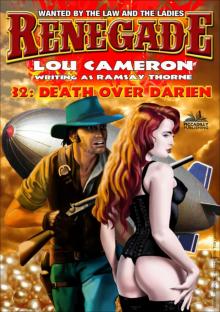 Renegade 32
Renegade 32 Renegade 31
Renegade 31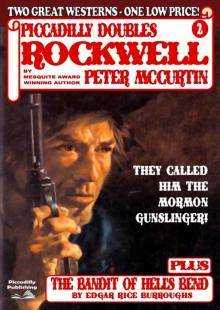 Piccadilly Doubles 2
Piccadilly Doubles 2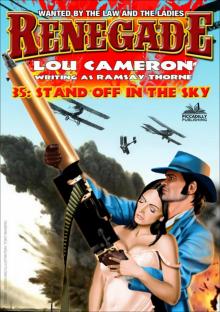 Renegade 35
Renegade 35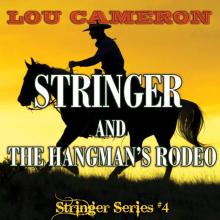 Stringer and the Hangman's Rodeo
Stringer and the Hangman's Rodeo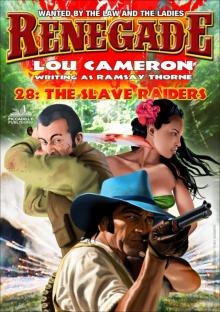 Renegade 28
Renegade 28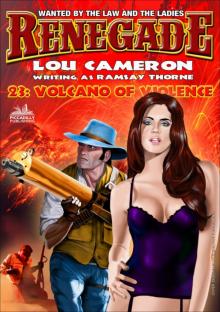 Renegade 23
Renegade 23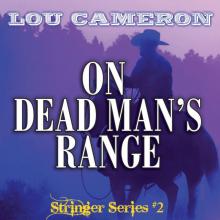 On Dead Man's Range
On Dead Man's Range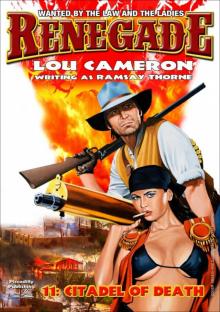 Citadel of Death (A Captain Gringo Western Book 11)
Citadel of Death (A Captain Gringo Western Book 11)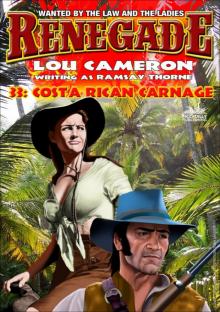 Renegade 33
Renegade 33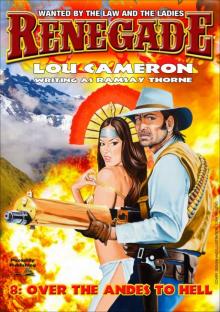 Over the Andes to Hell (A Captain Gringo Western Book 8)
Over the Andes to Hell (A Captain Gringo Western Book 8)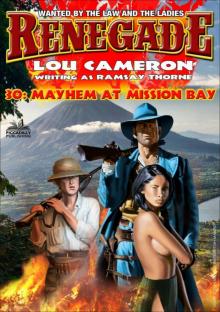 Renegade 30
Renegade 30 Renegade 36
Renegade 36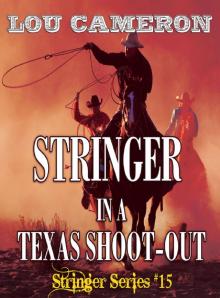 Stringer in a Texas Shoot-Out
Stringer in a Texas Shoot-Out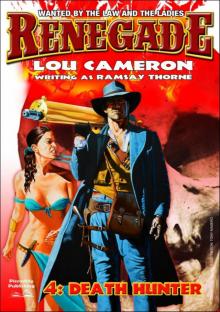 The Death Hunter
The Death Hunter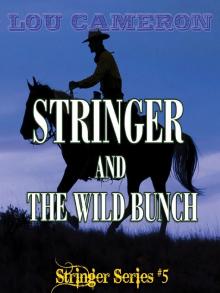 Stringer and the Wild Bunch
Stringer and the Wild Bunch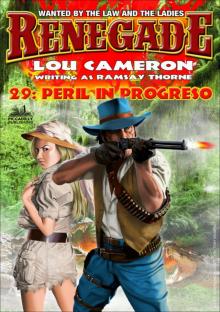 Renegade 29
Renegade 29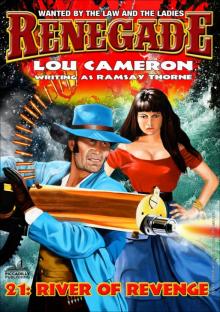 Renegade 21
Renegade 21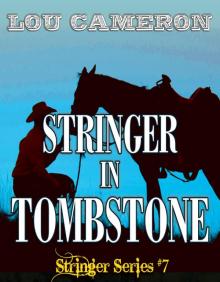 Stringer in Tombstone
Stringer in Tombstone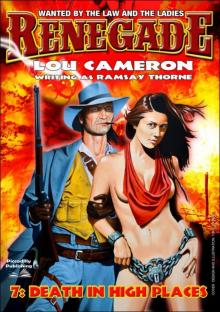 Death in High Places (A Renegade Western Book 7)
Death in High Places (A Renegade Western Book 7)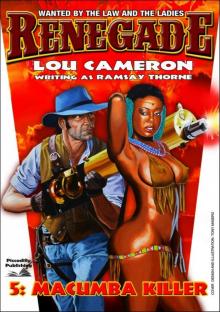 Macumba Killer
Macumba Killer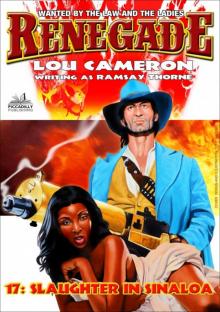 Renegade 17
Renegade 17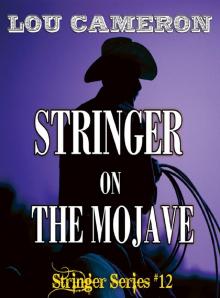 Stringer on the Mojave
Stringer on the Mojave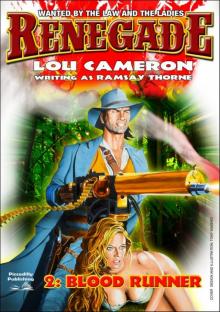 Blood Runner
Blood Runner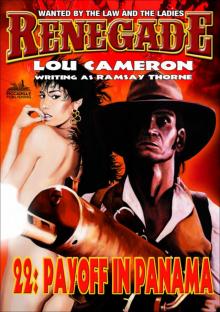 Renegade 22
Renegade 22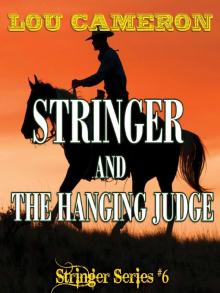 Stringer and the Hanging Judge
Stringer and the Hanging Judge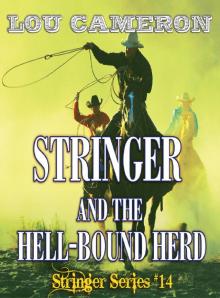 Stringer and the Hell-Bound Herd
Stringer and the Hell-Bound Herd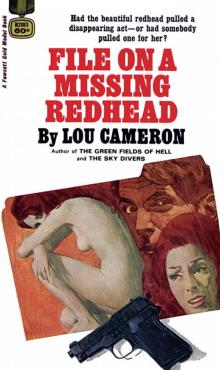 File on a Missing Redhead
File on a Missing Redhead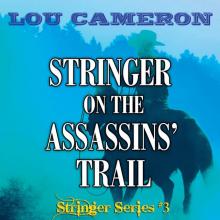 Stringer on the Assassins' Trail
Stringer on the Assassins' Trail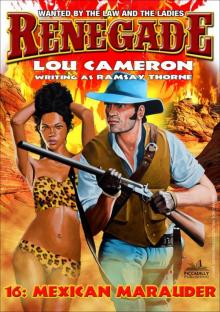 Mexican Marauder (A Captain Gringo Adventure #16)
Mexican Marauder (A Captain Gringo Adventure #16)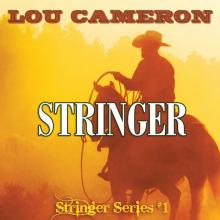 Stringer
Stringer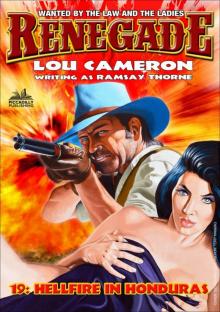 Renegade 19
Renegade 19 Stringer and the Oil Well Indians
Stringer and the Oil Well Indians Stringer and the Lost Tribe
Stringer and the Lost Tribe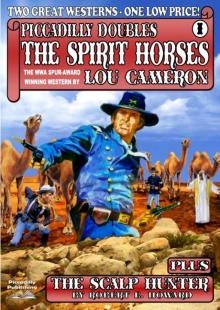 Piccadilly Doubles 1
Piccadilly Doubles 1 Stringer and the Border War
Stringer and the Border War Renegade
Renegade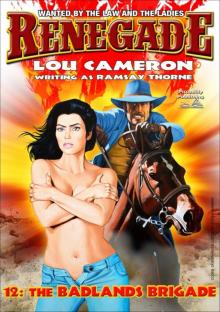 The Badlands Brigade (A Captain Gringo Adventure Book 12)
The Badlands Brigade (A Captain Gringo Adventure Book 12)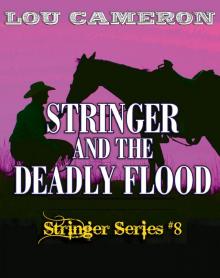 Stringer and the Deadly Flood
Stringer and the Deadly Flood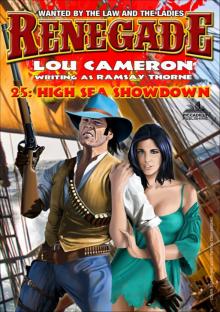 Renegade 25
Renegade 25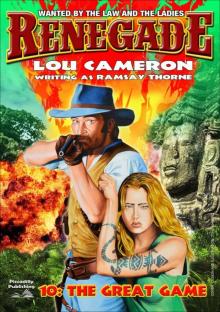 The Great Game (A Captain Gringo Western Book 10)
The Great Game (A Captain Gringo Western Book 10)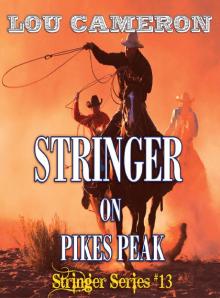 Stringer on Pikes Peak
Stringer on Pikes Peak